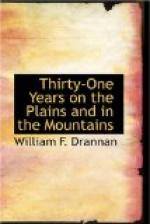Phil asked him why he would do so, and Carson replied: “Because I wouldn’t take the chances of being killed and eaten up by a cannibal like you.”
It might be well to give a brief description of this cannibal. He was a large, raw-boned man, who would weigh about two hundred and fifty pounds, though he was not very fleshy. He always wore his hair long and never combed it, also wore his beard long and never sheared or combed that. His hair grew down on his forehead almost to his eyes. In fact he looked more like an animal than a human being.
Three days’ travel brought us to South Platte, where we crossed the river and made camp on a little stream called Sand Creek. It was our custom to stake our saddle horses out at night as near camp as good grass could be found. The following morning Johnnie West and myself had been out after the pack animals, and on our return when within about a quarter of a mile from camp, we heard a rumbling noise that sounded like a band of buffalo in a stampede. We looked off to our right and saw a large herd of horses, driven by seven Ute Indians, who were pushing them at the greatest possible speed. We urged our horses in the direction of camp as fast as possible. As soon as we were in sight of camp, we gave the alarm and every man sprang to his gun, mounted his horse and was ready to receive them. The Indians did not see us until they had run the herd of horses almost into our camp. Our saddle horses being fresh, we succeeded in killing the seven Indians before they got far away, and captured the herd of horses, which proved to be a herd they had stolen from the, Arapahoe Indians the night before, and in less than an hour, Gray Eagle, the Arapahoe chief, came along in pursuit, accompanied by fifty of his select warriors. When Uncle Kit showed him the dead Utes, he walked up to one of them, gave him a kick and said: “Lo-mis-mo-cay-o-te,” which means, “All the same as cayote.”
Gray Eagle gave us each a horse, thanked us very kindly and returned to his village with his animals.
We proceeded on our journey to Santa Fe, which took us twelve days. Here we met our old friend, Joe Favor, who we had sold our furs to the year before, and who bought them again this season.
Furs being still higher this year, notwithstanding our small catch, Uncle Kit did fairly well out of his winter’s trapping.
After settling up with Uncle Kit, Mr. Favor called me into the store and presented me with a single-shot, silver-mounted pistol, also a knife that weighed two and one-fourth pounds, that had been manufactured in St. Louis. We stopped at Santa Fe and rested two days, after which time Uncle Kit, Johnnie West, myself and my pet panther returned home to Taos, which was a distance of ninety miles from Santa Fe.
CHAPTER VI.
Two boys ride to the city of Mexico. Eleven hundred miles of trial, danger and duty—–A gift horse.—The wind river mountains.




